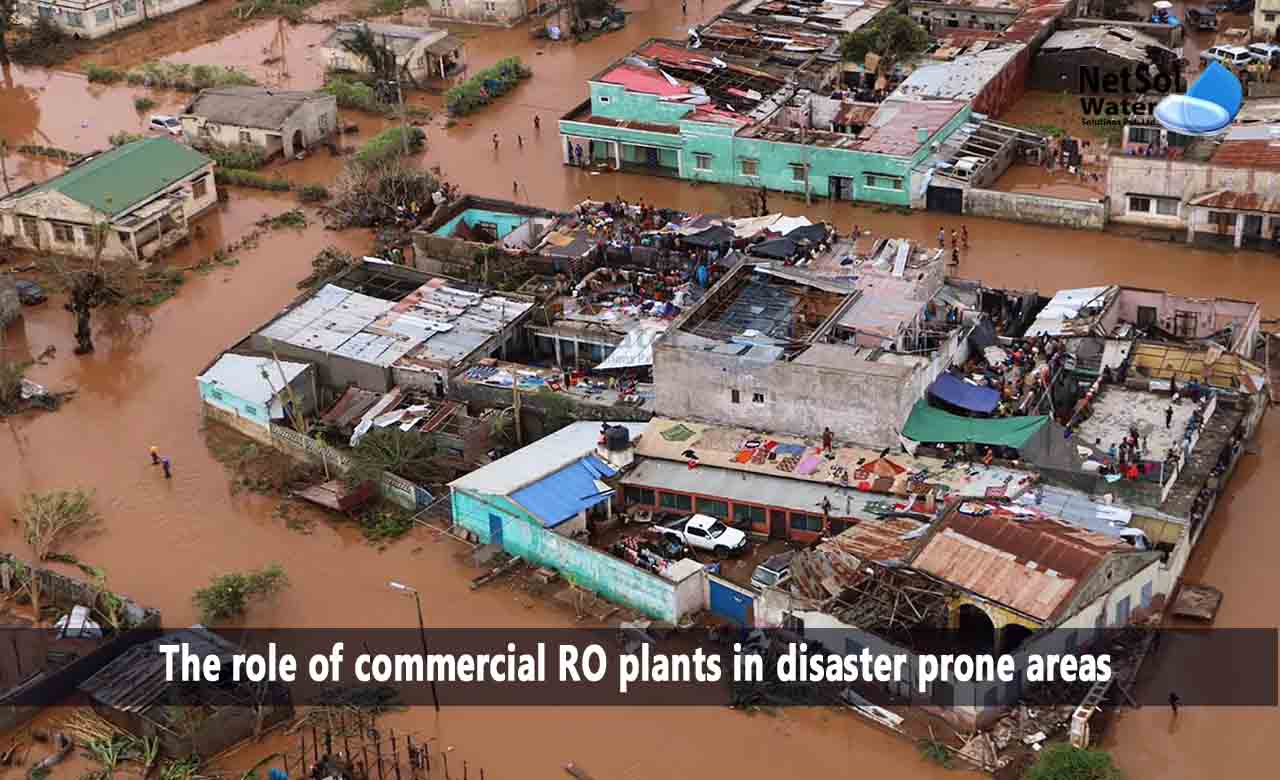What is the role of commercial RO plants in disaster-prone areas?
Water security is a critical concern, particularly in disaster-prone areas where natural calamities can disrupt the regular water supply. Commercial reverse osmosis (RO) plants have emerged as a valuable solution for supporting water security in such regions.
Now we will find the role of commercial RO plants in disaster-prone areas, highlighting their benefits, operation, and considerations.
Understanding Water Security in Disaster-prone Areas
We can understand water security in disaster prone areas in following points:
· Challenges Faced:
Disaster-prone areas, including regions prone to hurricanes, earthquakes, floods, or droughts, face significant challenges in maintaining a reliable water supply. Infrastructure damage, contamination of water sources, and disruptions to water treatment facilities can severely impact the availability of safe drinking water.
· Importance of Water Security:
Water security is crucial in disaster-prone areas to ensure the well-being and survival of the affected population. Access to safe and clean drinking water is essential for preventing waterborne diseases, supporting hygiene, and facilitating recovery efforts in the aftermath of a disaster.
Role of Commercial RO Plants in Supporting Water Security
Some of the role of commercial RO Plants in supporting water security are as follows:
· Emergency Response:
Commercial RO plants play a vital role in emergency response efforts. These plants can be quickly deployed to disaster-affected areas to provide immediate access to safe drinking water. With their ability to remove contaminants and purify water from various sources, commercial RO plants ensure the availability of clean water during critical times.
· Mobile and Modular Solutions:
Commercial RO plants offer flexibility through mobile and modular designs, making them suitable for disaster-prone areas. Mobile units can be transported to affected locations, while modular systems can be easily scaled up or down based on the water demand. This adaptability allows for rapid deployment and efficient utilization of resources.
· Reliable Water Supply:
Commercial RO plants provide a reliable water supply in disaster-prone areas. These plants are designed to remove impurities, dissolved solids, and contaminants, ensuring that the produced water meets the required quality standards. The consistent supply of clean water supports the immediate needs of affected communities and helps prevent waterborne diseases.
Considerations and Implementation
Some considerations and implementations that we can be taken are as follows:
· Preparedness Planning:
Disaster-prone areas should incorporate commercial RO plants into their preparedness plans. Assessing the specific water security challenges and identifying suitable locations for the installation of RO plants are essential. Collaboration with relevant stakeholders, such as local authorities, NGOs, and disaster management agencies, is crucial for effective implementation.
· Water Source Assessment:
Understanding the available water sources in the area is vital for determining the appropriate pre-treatment processes and system design. Pre-treatment processes may include filtration, sedimentation, or disinfection to remove suspended solids, sediments, and microbial contaminants. Assessing the water quality and potential risks ensures that the commercial RO plant can effectively purify the available water sources.
· Capacity and Scalability:
Assessing the water demand during emergencies and planning the capacity of the commercial RO plant accordingly is essential. The system should be scalable to meet the fluctuating water demand during different phases of the disaster response. Adequate storage facilities and distribution networks should also be considered to ensure the efficient supply of purified water.
Summary:
Commercial reverse osmosis plants play a crucial role in supporting water security in disaster-prone areas. With their ability to provide a reliable and safe water supply during emergencies, these plants are instrumental in meeting the immediate needs of affected communities. Proper planning, water source assessment, and capacity considerations are key to implementing commercial RO plants successfully in disaster-prone regions. By supporting water security, commercial RO plants contribute to the resilience and recovery of communities in the face of natural disasters.
Leading manufacturer of sewage treatment plants in India.
Netsol Water is the leading manufacturer, supplier, and exporter of a quality selection of water treatment, and wastewater treatment products in India, by using advanced sewage treatment methods.
RO plants, water softeners, ETPs, STPs, DM plants, AMC, O&M, Ultra filtration, UV, Ozonation, ZLD plants, Anoxic tanks, and other goods and services are available from us. We also provide services to businesses in sectors including automotive, pharmaceutical, textile, pulp & paper, beverages, refineries, schools, hospitals, office buildings, and hotels, among others.



